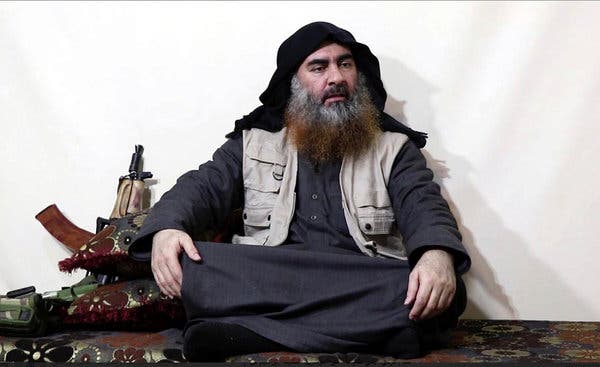ISIS Leader, Abu Bakr al-Baghdadi, Dies in a Military Raid

Credit…Al-Furqan media, via Associated Press
Abu Bakr al-Baghdadi, former leader of the Islamic State, died in Sunday military raid.
November 1, 2019
Abu Bakr al-Baghdadi, also known as the black-clad leader who transformed a weakened uprising into a terrorist group and recruited thousands of people worldwide to form the global network known as ISIS, died at 48 during a U.S military raid in northwestern Syria, on Sunday. President Trump announced his death the same day, when al-Baghdadi detonated a suicide vest while accompanied by three children as United States Special Forces forced him into a dead-end tunnel.
“Last night, the United States brought the world’s number one terrorist leader to justice,” stated President Trump in a televised address from the White House. “Abu Bakr al-Baghdadi is dead.” Trump stated the preliminary tests confirmed his identity.
At the peak of ISIS, a territory once the size of Britain, al-Baghdadi terrorized countries with acts of extreme violence in more than three dozen countries. Being the world’s most-wanted terrorist leader, bounty set at $29 million, al-Baghdadi believed in the sacred practice of religion, while loathing non-believers as traitors of faith. He was also was known to use the power of the internet as the source of ISIS’ message. His manhunt consumed resources of multiple counties and spanned two presidential administrations.
There was no confirmation from the Islamic State taking responsibility for the incident until later in the week, quite uncommon when it comes to death of former leaders. The question now remains: what does this mean for ISIS? The group broke its silence Thursday to message the United States, announce a new leader, and warn the government: “Do not be happy.” In an audio recording, ISIS mourned the death of their leader. It was also confirmed that the heir to lead the Islamic State, Abu Hassan al-Muhajir, who was also the group’s spokesperson, had also been killed in the raid. His death was confirmed in an airstrike elsewhere in northern Syria. However, the Islamic State had already appointed a new leader, Abu Ibrahim al-Hashemi al-Qurayshi, whom it identified as the “emir of the believers” and “caliph.”
Analyst and journalist, Daniele Raineri, who has studied the Islamic State’s leadership for over a decade, has concluded that successors of new positions often come with a new nom de guerre (a name in which someone acquires when heading into combat or another activity).The new leader, al-Qurayshi, may have had a completely different name before the death of al-Baghdadi. The “al-Qurayshi” at the end of his name means he is descendant of the Quraysha tribe of the Prophet Muhammad. The Islamic State considers this lineage suitable for a person becoming a caliph, or a ruler of Muslim Theocracy.
Colin P. Clarke, a senior fellow at Soufan Center, a research center in New York, stated that even in the death of al-Baghdadi, though the world believes this is the death of ISIS, “his group’s core leadership continues to believe it can operate much as it has in the past.”
President Trump stated in his Sunday address how “sick and depraved” al-Baghdadi was and how his followers were also “losers.” Some have questioned Trump’s details on the raid, including the state al-Baghdadi was in when he died. The New York Times credited the “provocative language” to Tump’s intentions to bolster the Special Forces’ achievement. Trump stated six times that the terrorist leader was “whimpering” as military dogs chased him through the tunnel. However, Secretary Mark T. Esper, who monitored the raid with Trump in the Situation Room on Sunday, explained that he heard nothing of the sort. In fact, other officials stated that it is impossible to hear a sound so small with the overhead drone feed. On the other hand, many are also stating that the President could have just gotten some details from the people on the ground.
The raid came during an impeachment battle and controversy on President Trump’s decision to pull most of the American Forces out of Syria. He made a point of refusing to inform Speaker of the House Nancy Pelosi and any of the Democratic party about the raid beforehand. His reasoning was that he didn’t want the decision to be “leaked.” However, he stated earlier he had notified Russia in advance.
Intelligence officers and analysts are trying to make sense of the seven-minute, 37-second announcement made by the terrorist group. “Do not be happy America, for the death of Sheikh al-Baghdadi, and do not forget the cups of death at his hands, may God accept him,” the announcement said. The announcement also took aim at the United States power handle, President Trump, “Don’t you see how you became the laughingstock of the nations, and an old and crazy man controls your fate, whose opinion changes between morning and evening?” The announcement called upon supporters to pledge allegiance to the new leader, a custom that took new meaning under al-Baghdadi’s reign. Counterterrorism officials have stated to expect strings of videos of many pledging their allegiance to ISIS in known hot spots affiliated with the group, including Afghanistan, Sinai, the Philippines, and others.
Officials are still trying to pin-point an identity on the new leader of the Islamic State. A recent announcement by the State Department is offering a $5 million reward for whoever brings information leading to the capture of al-Qurayshi.
ISIS also appointed a new spokesperson, Abu Hamza al-Qurayshi, another prospect from the Prophet’s tribe. The new appointment will most likely lead to a new successor. However, the government is yet to gravel up any sort of identity.
“Those names are the most generic names I can think of in a long time,” Mr. Raineri said. “This trick is obfuscating on purpose the possible links to people we know.”
